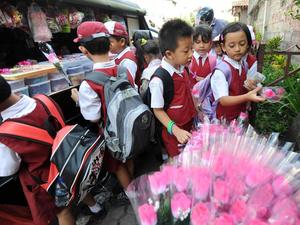Uzbekistan Backs Poetry Readings to Replace 'Alien' Valentine's

Uzbekistan is urging young people to shun "alien" Valentine's Day traditions such as sending cards, saying they should instead enjoy the love poetry of a 15th-century warrior-prince.
The Central Asian country has turned February 14 into "national poetry day," as the government attempts to combat what it calls the "pernicious influence" of Western mass culture.
Uzbekistan's authorities began to discourage celebrations of Valentine's Day in 2012. Before then, the exchange of lovers' messages on commercial radio and television stations was a growing trend in the secular country where most people are Muslim.
Now, although there is no official ban on Valentine's Day, universities in the landlocked nation of about 30 million have ordered their students not to mention it. Students have also been urged not to exchange Valentine's cards.
- 'Alien culture' -
The authorities do not want young people "to follow alien mass culture blindly" said Ikbol Mirzo, the deputy chairman for youth issues at Uzbekistan's state-sponsored Writer's Union.
"So, we are turning February 14 into Babur Day -- a day of courtly love and faithfulness," Ikbol said.
The date was chosen because it is the birthday of Zahiriddin Muhammad Babur, who ruled part of present-day Uzbekistan before founding the three-century Mughal dynasty in India. He also had a passion for prose and poetry.
"We are not against love, not against sweethearts or exchanging gifts on this day. This is all about the symbols that are used on this occasion," Ikbol told AFP.
He quoted a line of Babur's love poetry: "When I bend down to the earth to kiss her foot, I feel my head is in the heavens."
"I don't know any other poet who glorified women and raised themes of lovesickness, homesickness and fidelity so evocatively as Babur," Ikbol said.
- 'Holiday from the devil' -
Uzbekistan has planned poetry festivals throughout the country for February 14 including an event in Tashkent's biggest shopping centre.
It has also released an album of songs based on Babur’s verses by a popular singer, Ozodbek Nazarbekov.
Babur’s poetry is a source of pride for ordinary people in Uzbekistan, many of whom can recite his lines by heart.
One political analyst, who asked to remain anonymous, said the government’s efforts to push Babur Day instead of Valentine’s Day are likely to have more impact in the conservative provinces than in more cosmopolitan Tashkent.
"Our officials love to ban something first, and only later think about the consequences. This is what happened with rap and rock," the political analyst told AFP.
In 2011 Uzbek state television condemned rap and rock as "Satanic" and a source of evil. However, officials were later forced to back down and say rap was acceptable as long as singers picked patriotic themes.
The government's policy on Valentine's Day could gain significant support "especially from the older generation, who fear Western culture may undermine local values," the political analyst said.
Uzbekistan is not the only Central Asian state to frown on celebrating Western holidays.
In neighbouring Kyrgyzstan, a conservative lawmaker last year called for a ban on Valentine's celebrations in schools, calling it the "holiday from the devil", although no ban was adopted.
In Tajikistan, which also borders Uzbekistan, police reportedly broke up Halloween parties in 2013 and 2014, although there is no law against celebrating the holiday.
